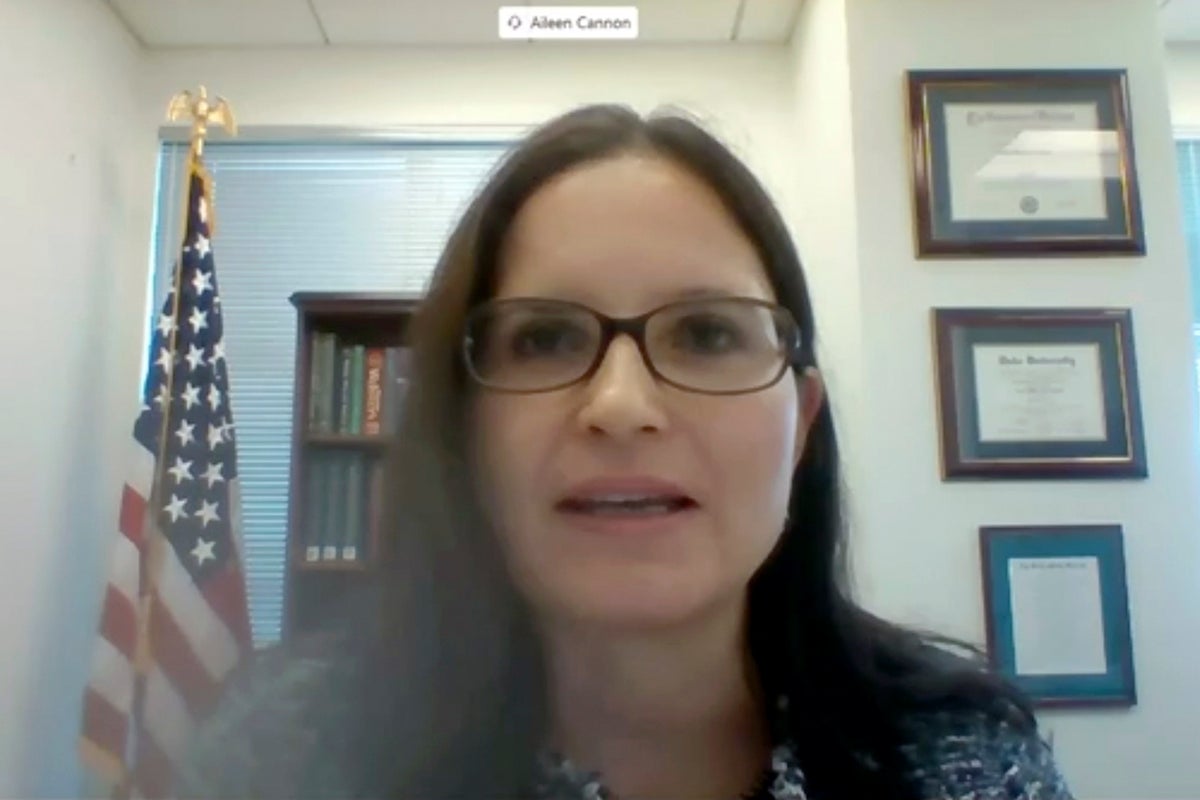
The Donald Trump-appointed judge overseeing the criminal case into his handling of classified documents has sided with the former president once again – dealing multiple blows to special counsel Jack Smith.
Judge Aileen Cannon, who was appointed to the bench during Mr Trump’s final days in office, on Monday struck down two of Mr Smith’s court filings and gave him a dressing down over his use of grand juries in the case.
In the ruling filed in south Florida, the judge rejected the Justice Department’s request for sealed filings in order to preserve the “grand jury secrecy” in the case where Mr Trump is currently facing 40 charges.
“The Special Counsel states in conclusory terms that the supplement should be sealed from public view ‘to comport with grand jury secrecy,’ but the motion for leave and the supplement plainly fail to satisfy the burden of establishing a sufficient legal or factual basis to warrant sealing the motion and supplement,” she wrote in the brief.
Judge Cannon ordered that two such sealed filings be struck from the record altogether.
These filings related to a motion brought by Mr Smith’s office arguing that Stanley Woodward – the attorney for Mr Trump’s aide and codefendant Walt Nauta – has potential conflicts of interest as he represents other individuals who could be called to give testimony in the case.
In Monday’s brief, Judge Cannon also questioned what she described as the “legal propriety” of Mr Smith’s office using an out-of-state grand jury to investigate the case.
Prosecutors were ordered to file a response which “shall address the legal propriety of using an out-of-district grand jury proceeding to continue to investigate and/or to seek post-indictment hearings on matters pertinent to the instant indicted matter in this district”.
Most of the classified documents case is being handled out of Judge Cannon’s district in South Florida – where Mr Trump’s Mar-a-Lago sits.
However, some grand jury work in the case was also carried out in Washington DC.
Aileen Cannon is presiding over Trump’s classified documents case— (AP)
Judge Cannon took issue with this and questioned why a grand jury heard evidence in DC after Mr Trump had already been indicted by a grand jury in Florida.
She has demanded that Mr Smith’s office respond to the court filing by 22 August with an explanation.
Her latest briefs have raised fresh questions about the judge’s handling of the case – given she was appointed by Mr Trump and has repeatedly handed him favourable, and questionable, rulings.
Former US attorney Andrew Weissmann described the judge’s filing as “off base”.
“Judge Cannon clearly shows her ignorance (bias? both?); the obstruction crimes that were investigated are charges that could have been brought in [Florida] or in DC and thus could be investigated in either district,” he wrote on Twitter.
“And there was conduct that is alleged to have occurred outside [Florida].”
Last year, Judge Cannon, who was randomly assigned to preside over the case following Mr Trump’s indictment in June, previously sided with Mr Trump’s request to appoint an independent special master to review the documents in the classified papers case before they could be handed to the DOJ.
The decision was branded “deeply flawed” by Mr Trump’s own former attorney general Bill Barr and was later thrown out by an appeals court.
Superseding indictment in classified documents case— (Copyright 2023 The Associated Press. All rights reserved.)
Mr Trump was initially indicted on 37 federal charges in early June over his alleged mishandling of classified documents, becoming the first current or former US president ever charged with a federal crime. He pleaded not guilty to the charges at his arraignment in a Miami federal courthouse. His longtime aide Mr Nauta was also charged in the case as his co-defendant.
In a superseding indictment filed in late July, Mr Trump was hit with three new charges and a third defendant – Mar-a-Lago property manager Carlos De Oliveira – was added to the federal criminal case.
Prosecutors now allege that Mr Trump even went as far as to plot with two employees to delete security footage from Mar-a-Lago in his quest to hide the classified documents – and what exactly he was doing with them.
Now, with the additional charges, Mr Trump has a total of 40 federal counts over his handling of classified documents.
Last week, he was also charged in a separate federal case over his role in the January 6 Capitol riot and his efforts to overturn the 2020 presidential election.
This comes after he was hit with state charges in New York in April over hush money payments to cover up affairs in the lead-up to the 2016 election.







